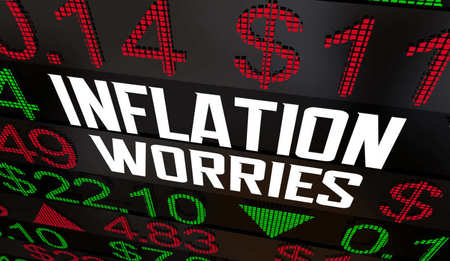
Inflation is a mystery for many. Unless you’re an economist, this economic phenomenon is elusive and mysterious. It’s also something that we have no control over. Yet, it wields an undeniable, powerful force over your finances. Because of this, it pays to try to understand what inflation is and its impact on your money.
What is Inflation?
Technically speaking, inflation is defined as the rate at which prices inflate and purchasing power declines. There’s a direct link between the two. When prices of goods and services go up, the value of your dollar goes down. To put it into simple language, if you have $10 and apples cost a dollar each, you can buy ten apples. When the price of apples inflates to $1.50, you can only buy six apples. The price went up, so your purchasing power went down. Think of it like a seesaw.
Inflation and the Economy
With inflation, it’s not just your personal finances that are affected. Sure, you can’t buy as many apples, but the dollar in general has less value in the market, and that holds true for all areas of the market, from the local fruit stand, to U.S. government purchases from foreign governments.
And, when the dollar falls in value, that means that other currencies are stronger than they were in relationship to the dollar. Someone using another currency, like euros, can buy more of an item that’s selling in U.S. dollars, because their currency value has become a little bit higher compared to our dollar.
So inflation in the U.S. impacts not just you and your household apple supply, but the entire world. That’s very overwhelming to think about, especially since there’s nothing you can personally do to control inflation.
Inflation and Your Investments
Inflation doesn’t just lower your purchasing power. It also hits home with your investments. A simple example would be a household with $1,000 in a savings account earning a modest 1% in interest. After a year, your $1,000 in savings will have grown to $1,010. But when inflation is at 2%, you lose 2% of your purchasing power. So even though you now have $1,010, it’s only worth $990. You actually lost value!
It gets worse. Inflation is cumulative. Over a period of ten years, with 2% inflation each year, the costs of goods and services will go up by about 22%, leaving you with that much less purchasing power.
How to Protect Your Finances Against Inflation
Hopefully, now you can see why you can’t just ignore inflation and how it impacts your money. And, while you can’t do anything to “cure” inflation, there are things you can do to mitigate its negative effects on your finances. Before making any major financial decisions, consult with your adviser of choice.
Consider Inflation-indexed Securities
Treasury Inflation-Protected Securities (TIPS) are inflation-indexed bonds. This means that they give you a fixed rate of return, but the principal value of the bond is adjusted for inflation, so you get some added protection. TIPS are available for purchase online at TreasuryDirect or through brokerage firms.
Avoid Getting Caught up in Purchasing Contracts
There are some home purchase programs where you can rent a property now, and then when you’re ready to buy a year or so later, you can purchase the property at its market value. In exchange for this “first right to purchase,” you pay a slightly higher rent rate than market value. But when the year comes for you to buy, odds are extremely high that the house price will have risen. So all you’re getting out of the deal is the “chance” to pay higher rent than you should have paid for an entire year. No matter what, you’ll have to pay more for the house at a later date. You would have been better off paying lower rent elsewhere and investing your accrued down payment money in something like TIPS bonds or another smart investment vehicle.
Keep Debt Low
With declining purchase power comes a reduced ability to repay debt. High levels of debt will be crippling in high inflation scenarios, especially if the debt interest rate is fixed. Keep your debt exposure to a minimum in order to help ensure your financial security when inflation rises.
Buy Now
If you’re planning on making major purchases that you can readily afford to buy now with cash, it might be smart to buy now before prices go up. Examples include a new roof on the house or a new addition on your home, since construction materials are some of the first to go up when inflation rises. Other examples include large home appliances like furnaces and water heaters. Remember, only consider this strategy if you can afford to pay cash.
Reduce Frivolous Spending
As much as possible, curb spending on non-essentials when inflation is high. You’ll end up paying more for things that won’t hold their value, or waste money that you may need for essentials like shelter, food, clothing or transportation. The government hopes you’ll consume more in order to boost the economy and keep inflation in check, but leave that up to wealthier folks who aren’t having to look for quarters in the couch at the end of the month. The economy will be just fine without you buying a new plasma screen this month.
When inflation is especially bad and you’re having to tighten your purse strings, it’s a good idea to check in with your CPA. Your CPA can help you to identify ways to better manage cash flow, find hidden tax deductions and advise on your financial moves in a difficult economic climate.
by Kate Supino
